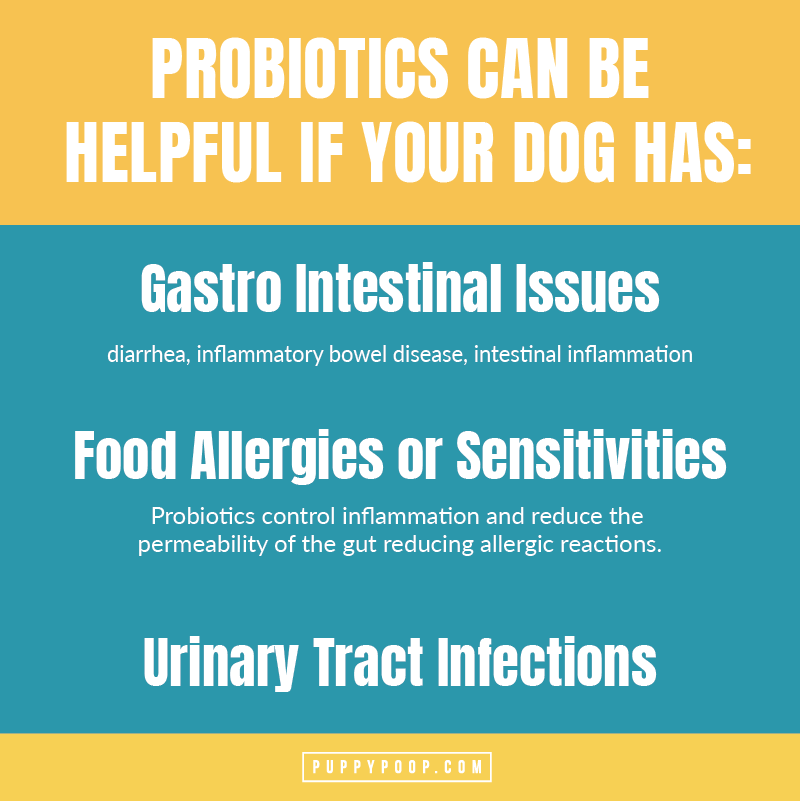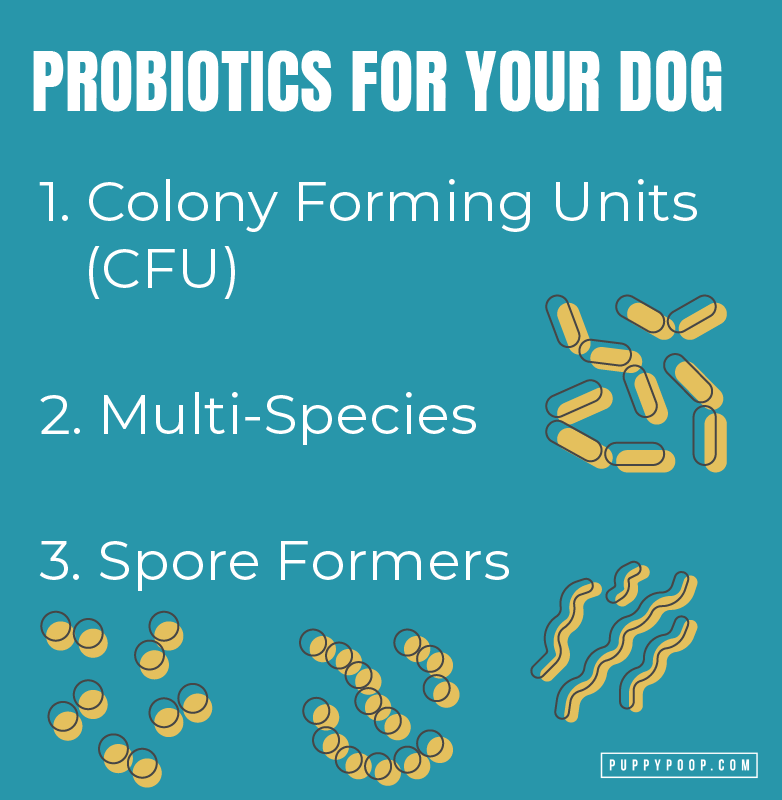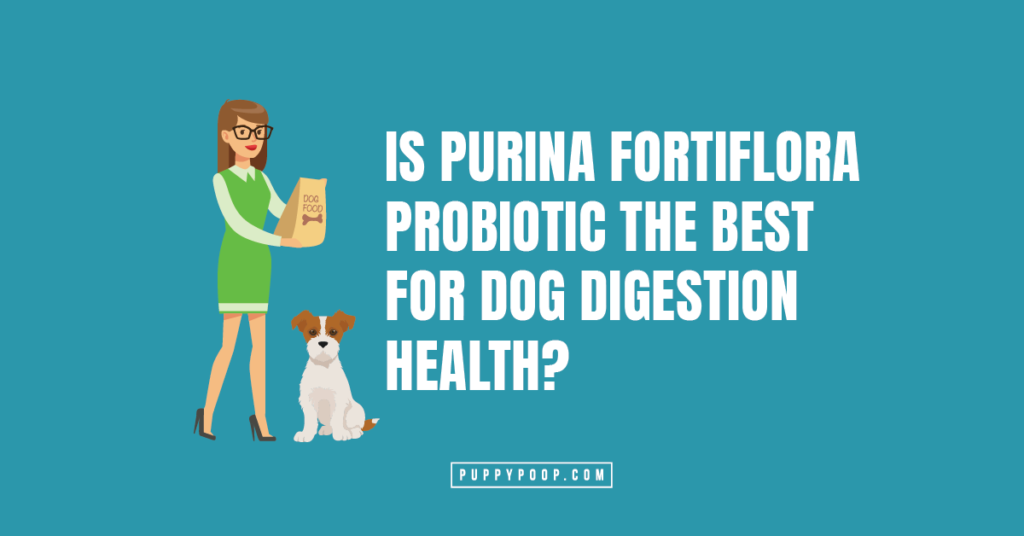Making the best decisions for our dog digestion health can be time consuming and stressful sometimes! From choosing a dog sitter to picking a probiotic, the choices feel endless. On top of this, sifting through so much information on the internet can be overwhelming.
If your dog has ever been prescribed a probiotic by their veterinarian, it may have been Purina Fortiflora. Fortiflora is a popular and widely available probiotic for dogs. Probiotics are often recommended for cases of diarrhea or inflammatory bowel disease. They may also be prescribed alongside antibiotics, such as metronidazole. In these cases, probiotics may help to improve and maintain the beneficial gut bacteria. However, more research is needed in this area.
Probiotics can be used as a daily supplement to maintain gut and immune system health for your dog. We love probiotics because of their ability to provide preventive and reactive help for our dogs! Since not all probiotics are the same, we’ll try to help break down the facts about some popular brands so that you can make the most informed decision.
What are probiotics for dogs and how do they work?
Probiotics are the friendly bacteria that support your dog’s health. Probiotics can be found in supplements, natural foods, and certain yeast species. Sometimes your dog’s food may have added probiotics as well. Note: It’s important to note that most pet foods may claim to contain probiotics when they actually don’t. For these reasons, we support giving an additional probiotic supplement to your dog.
Probiotics work by:
- Aiding digestion
- Producing vitamins and enzymes
- Maintain gut acidity
- Keeping harmful bacteria levels down
- Supporting the immune system through the production of short-chain fatty acids. Fatty acids (acetate, propionate, and butyrate) provide food to friendly bacteria.
Probiotics benefit any dog, but they are particularly helpful if your dog experiences:
- Gastrointestinal issues: diarrhea, inflammatory bowel disease, intestinal inflammation
- Food allergies or sensitivities. Probiotics control inflammation and reduce the permeability of the gut reducing allergic reactions.
- Urinary tract infections

Probiotics rely on prebiotics, or soluble fiber, as food to thrive and function. The most commonly used prebiotics include Fructooligosaccharides or inulin fiber. Prebiotics maintain beneficial bacteria and prevent harmful bacteria from overgrowing.
Choosing the Best Probiotic for your Dog
Choosing a probiotic can be tough, especially when there are so many options. To help, there are a few factors to consider when choosing the best probiotic for your dog.
The top 4 probiotic characteristics to look out for are:
- Number of Colony-forming units (CFU): CFUs are the amount of live bacteria present in a sample size of the product. CFUs should be between 1-4 billion.5 We prefer at least 3 billion CFUs.
- Variety and type of bacterial species
- Presence of spore-forming species
- Presence of prebiotic. Prebiotics are the food for probiotics.

Probiotics for Dogs: Purina Fortiflora and Other Options
To help you choose the best probiotic for your dog, we’ve provided a quick comparison of some brands. We will look at common veterinarian-prescribed probiotics but also other expert recommended products.
Dog Probiotic | Quick Guide Description |
|---|---|
| Adored Beast Apothecary Fido’s Flora | – 2 billion CFU of 14 species: – Streptococcus thermophilus, Bifidobacterium infantis, Bifidobacterium longum, Bifidobacterium bifidum, Bifidobacterium breve, Lactobacillus lactis, Lactobacillus rhamnosus, Lactobacillus plantrum, Lactobacillus paracasei, Lactobacillus helveticus, Lactobacillus salivarius, Lactobacillus bulgaricus, Lactobacillus acidophilus, Lactobacillus casei – With 2 canine-specific strains – No spore-forming bacteria – Contains prebiotic – Powder form and refrigeration is required |
| Purina Calming Care Probiotic for Dogs | – 1 billion CFU of 1 species Bifidobacterium longum – Maintain calming behavior – For separation anxiety, fear of new visitors, and sound phobias – Maintain heart health during stressful events – Powder form with no refrigeration required |
Purina Fortiflora for Dogs | – 100 million CFU of 1 species: Enterococcus faecium – Microencapsulation provides ‘live’ beneficial bacteria to your dog’s gut – No prebiotics – No spore-forming bacteria – Available as powder or chew with no refrigeration required |
| Nutramaxx Proviable- Forte Probiotic | – 10 billion CFU per capsule/0.5 billion CFU per gram of paste of 7 species: Enterococcus faecium, Bifidobacterium bifidum, Enterococcus thermophilus, Lactobacillus acidophilus, Lactobacillus bulgaricus, Lactobacillus casei, Lactobacillus plantarum – Contains prebiotics – No spore-forming bacteria – Several formats including sprinkle capsules and paste and chewable tablets with no refrigeration required |
| Van Beek Synacore | – 5 billion CFU per packet of 5 species: Bifidobacterium longum, Saccharomyces boulardii, Lactobacillus helveticus, Aspergillus niger, Lactobacillus casei – Mix of enzymes, probiotics, prebiotics, yeast and vitamins – No spore-forming bacteria – Powder form with no refrigeration required |
All of the probiotics, except for Nutramaxx Proviable-Forte, can be readily purchased online. Most of the probiotics listed here cost approximately $1/day based on our research at the time of publication. Exceptions include: Fido’s Flora by Adored Beast Apothecary and Proviable-Forte, which vary due to dog size and veterinarian pricing.
So, which probiotic should you choose?
Any probiotic will provide some benefit to your dog with very little chance of any side effects. So don’t worry too much about adding probiotics to your dog’s healthcare routine. Similar to optimal dog diets, variation and rotation is highly encouraged and beneficial. Choosing to add probiotics to your support optimal health for your dog is a great decision to begin with!
Special Considerations
For dogs that recently finished or are currently on antibiotics, there are some extra considerations that must be taken. Antibiotics kill bacteria indiscriminately. This reduces both the friendly and harmful bacteria. Probiotics are thought to help build up this natural flora. However, a recent study in humans and mice has found that probiotic use after antibiotics may actually slow gut recovery. Despite this, some probiotic species can still benefit your dog. A yeast, Saccharomyces boulardii, is one such probiotic. Because it is a yeast rather than a bacteria, it tends to survive despite the antibiotics! Even so, more research is still needed to understand this interaction between antibiotics and probiotics. If you are using probiotics and antibiotics at the same time, it is important to wait at least 2 hours between these medications. This will reduce the risk of the probiotic being destroyed by the antibiotic.
Get the DIG Labs App
Download the free DIG Labs Digestive Health Tracker to get personalized insights and recommendations for your dog based on their stool.

